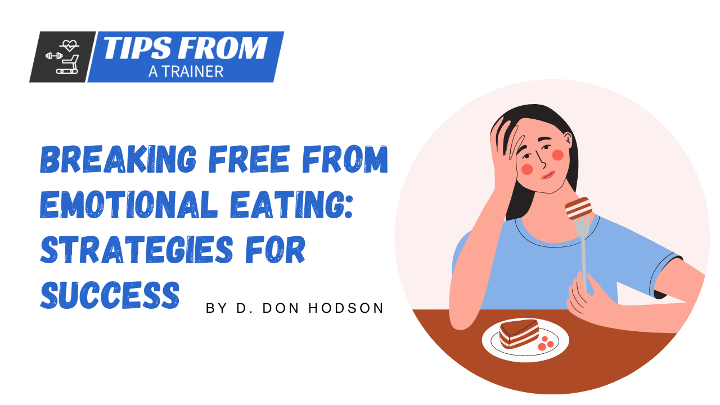Introduction
Emotional eating is a complex behavior that many individuals struggle with at different points in their lives. It involves using food as a means to cope with and alleviate negative emotions such as stress, sadness, anxiety, or boredom. While it may provide temporary comfort, emotional eating often leads to feelings of guilt, shame, and dissatisfaction in the long run. In order to develop a healthier relationship with food and overcome emotional eating, it's crucial to delve deeper into understanding the underlying causes and implementing effective strategies to manage emotions.
Table of Contents
Introduction
Understanding Emotional Eating
Recognizing Emotional Hunger vs. Physical Hunger
Uncovering the Root Causes
Building Emotional Resilience
Developing Healthy Coping Mechanisms
Emotional Awareness
Mind-Body Practices
Stress Management
Creative Outlets
Support Systems
Intuitive Eating
Mindful Eating
Honor Hunger and Fullness
Challenge Food Rules
Emotional Check-Ins
Building a Nourishing Environment
Stock a Nourishing Pantry
Plan and Prepare Meals
Mindful Eating Spaces
Supportive Relationships
Coping with Setbacks
Self-Compassion
Reflect and Learn
Seek Support
Stay Resilient
Celebrating Progress
Reflect on Achievements
Reward Yourself
Share Your Success
Set New Goals
Conclusion

Understanding Emotional Eating
To address emotional eating, it's important to gain a deeper understanding of its nature and the factors that contribute to it. Emotional eating is not solely about physical hunger but rather an attempt to satisfy emotional needs through food. It's essential to recognize that emotional hunger is distinct from physical hunger. Emotional hunger tends to arise suddenly and is often accompanied by specific cravings for comfort foods, while physical hunger develops gradually and can be satisfied by a variety of nourishing options.
Various triggers can lead to emotional eating, including stress, loneliness, fatigue, relationship issues, or even specific environments or situations. By becoming more aware of personal triggers and patterns, individuals can break free from the cycle of emotional eating and develop healthier coping mechanisms.
Recognizing Emotional Hunger vs. Physical Hunger
Differentiating between emotional hunger and physical hunger is a crucial step in overcoming emotional eating. Emotional hunger is typically intense and sudden, with a strong desire for specific types of foods. It often involves seeking a quick fix to alleviate emotional discomfort. Physical hunger, on the other hand, develops gradually and is not tied to specific food choices. It can be satisfied by consuming a balanced meal.
Developing mindfulness around eating and paying attention to bodily cues can help distinguish between emotional and physical hunger. Take a moment to pause and ask yourself if you are truly physically hungry or if there may be an emotional trigger at play. Engaging in mindful eating practices, such as eating slowly, savoring each bite, and tuning into hunger and satiety cues, can foster a greater awareness of true physical hunger.
Uncovering the Root Causes
Emotional eating is often a symptom of deeper emotional issues or unresolved feelings. It's essential to explore and address these underlying causes to effectively break free from the cycle of emotional eating. Past experiences, traumas, low self-esteem, or unsatisfying relationships can all contribute to emotional eating behaviors.
Engaging in self-reflection and journaling can be powerful tools for uncovering the deeper emotions and triggers associated with emotional eating. Consider keeping a food and mood diary to track eating patterns and associated emotions. This practice can provide valuable insights into your behaviors and help identify recurring patterns or triggers. In some cases, seeking professional support from a therapist or counselor may be beneficial in addressing deep-rooted emotional issues and developing healthier coping mechanisms.
Building Emotional Resilience
Developing emotional resilience is a fundamental aspect of overcoming emotional eating. Emotional resilience involves the ability to manage and adapt to stressful situations and emotions in healthy and constructive ways. By enhancing emotional resilience, individuals can cultivate alternative strategies for coping with negative emotions, reducing the reliance on food as a primary source of comfort.
There are various techniques and practices that can help strengthen emotional resilience. Engaging in regular exercise has been shown to improve mood, reduce stress, and increase emotional well-being. These activities can provide a much-needed outlet for emotions and serve as healthy coping mechanisms.
Additionally, practicing self-care, engaging in activities that bring joy and fulfillment, nurturing social connections, and seeking support from loved ones are all important strategies for building emotional resilience. Creating a support network and surrounding yourself with individuals who understand and encourage your journey can make a significant difference in overcoming emotional eating patterns.
Developing Healthy Coping Mechanisms
One of the key steps in overcoming emotional eating is to replace unhealthy coping mechanisms with healthier alternatives. Identifying and implementing effective strategies to manage emotions without turning to food is crucial. Some helpful techniques include:
Emotional Awareness
Pay attention to your emotions and identify them without judgment. Recognize that emotions are a natural part of life and that it's important to acknowledge and process them.
Mind-Body Practices
Engage in activities that promote relaxation and self-soothing, such as deep breathing exercises, progressive muscle relaxation, or guided imagery. These techniques can help reduce stress and provide emotional comfort.
Stress Management
Explore stress-reducing activities like yoga, meditation, or regular exercise. These practices not only help manage stress but also promote overall well-being and emotional balance.
Creative Outlets
Channel your emotions into creative pursuits like painting, writing, or playing a musical instrument. These activities provide a healthy outlet for self-expression and can be therapeutic.
Support Systems
Lean on supportive friends, family members, or a support group who understand your struggles and can provide encouragement and guidance. Sharing your feelings with others can alleviate emotional burdens.
Intuitive Eating
Intuitive eating is an approach that encourages listening to your body's hunger and fullness cues, as well as honoring your cravings in a balanced way. It focuses on cultivating a healthy relationship with food and rejecting the diet mentality. Practicing intuitive eating can help break the cycle of emotional eating by reconnecting with your body's innate wisdom. Some principles of intuitive eating include:
Mindful Eating
Engage in eating with full presence and awareness. Slow down, savor each bite, and truly enjoy the flavors and textures of the food you consume.
Honor Hunger and Fullness
Pay attention to your body's signals of hunger and fullness. Eat when you are physically hungry and stop eating when you are comfortably satisfied.
Challenge Food Rules
Let go of restrictive food rules and embrace a flexible approach to eating. Give yourself permission to enjoy all types of foods in moderation without guilt or judgment.
Emotional Check-Ins
Before reaching for food, check in with yourself to determine if you are truly hungry or if there is an emotional trigger. Find alternative ways to address emotional needs without resorting to food.
Building a Nourishing Environment
Creating a supportive environment plays a vital role in overcoming emotional eating. By surrounding yourself with nourishing elements, you can set yourself up for success. Consider the following strategies:
Stock a Nourishing Pantry
Fill your pantry and refrigerator with nutritious, whole foods that you enjoy. Having a variety of healthy options readily available makes it easier to make nourishing choices.
Plan and Prepare Meals
Take the time to plan your meals in advance, ensuring they are balanced and include a variety of nutrients. Preparing your meals at home allows you to have control over the ingredients and portion sizes.
Mindful Eating Spaces
Create a dedicated eating area that promotes mindful eating. Clear away distractions, such as electronic devices, and create a calm and inviting space for meals.
Supportive Relationships
Surround yourself with individuals who support your goals and encourage positive habits. Seek out friends or family members who share similar health aspirations and can provide motivation and accountability.
Coping with Setbacks
It's important to acknowledge that setbacks are a normal part of any transformative journey. If you find yourself slipping back into emotional eating patterns, don't be too hard on yourself. Instead, view it as an opportunity for growth and learning. Some strategies for coping with setbacks include:
Self-Compassion
Treat yourself with kindness and understanding. Acknowledge that setbacks happen to everyone and that it's part of the process. Avoid self-criticism and instead focus on self-care.
Reflect and Learn
Take time to reflect on the circumstances that led to the setback. Identify any triggers or underlying emotions that contributed to emotional eating. Use this knowledge to develop strategies to prevent future setbacks.
Seek Support
Reach out to your support system during challenging times. Share your experiences and seek guidance from individuals who understand your journey and can offer encouragement and advice.
Stay Resilient
Remember that setbacks do not define your progress. Stay committed to your goals and focus on the positive changes you have made so far. Use setbacks as an opportunity to grow stronger and more resilient.
Celebrating Progress
As you make progress in overcoming emotional eating, it's essential to celebrate and acknowledge your achievements. Celebrating milestones, both big and small, can reinforce positive behaviors and motivate you to continue on your journey. Some ways to celebrate progress include:
Reflect on Achievements
Take time to recognize and appreciate the positive changes you have made in your relationship with food and emotions. Celebrate the moments when you choose nourishing options or use healthy coping strategies.
Reward Yourself
Treat yourself to non-food rewards for reaching specific goals or milestones. This could include pampering yourself with a spa day, buying a new book or item you've been wanting, or engaging in a favorite hobby.
Share Your Success
Share your journey and achievements with your support network. Let them celebrate with you and offer words of encouragement. Sharing your success can inspire others and create a sense of accountability.
Set New Goals
As you reach milestones, set new goals to continue your growth and progress. Whether it's trying new healthy recipes, participating in a fitness challenge, or exploring new self-care practices, setting new goals keeps you motivated and focused.
Conclusion
Overcoming emotional eating is a transformative process that requires self-awareness, self-compassion, and a commitment to change. By implementing the strategies outlined in this article, you can begin to break free from emotional eating patterns and develop a healthier relationship with food and emotions.
Remember, progress may not always be linear, and setbacks are normal. Be patient with yourself, celebrate your successes, and seek support when needed. With time and perseverance, you can create lasting change and reclaim control over your eating habits and overall well-being.

Don Hodson, Certified Personal Trainer
I'm Don, an ACE-certified personal trainer and the founder of Tips From A Trainer. With my passion for fitness and years of experience, I've helped countless individuals transform their physiques!
Having personally overcome weight challenges throughout my life, I understand the struggle. Through consistency, exercise, and a balanced diet, I have managed to stay in shape and I want to share my message with the world!
The fitness industry is fraught with misconceptions and deceptive practices, which is why I am committed to providing you with the truth.
- My Site: www.Don-Hodson.com
- My Company: www.ConnectedAgeMarketing.com

Breaking Free from Emotional Eating